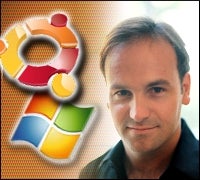 |
| Ubuntu founder Mark Shuttleworth Source: Canonical |
Microsoft might be betting big on Windows 7, the next version of its flagship operating system, but to Ubuntu Linux founder Mark Shuttleworth, the upcoming release is really an opportunity for Linux to shine.
Granted, Linux on the desktop has not made as much of a dent against Windows as it has in the datacenter. But Shuttleworth, who is also CEO of Ubuntu’s commercial backer Canonical, figures the desktop itself and the applications that people are using are changing in ways that make the coming desktop battle different than it has ever been before.
“The principals of diversity in the desktop space are well established,” Shuttleworth told InternetNews.com. “The benefits to consumers and industry of having an alternative are very substantial. Any change in the status quo is an opportunity.”
For Microsoft, the changing status quo revolves around its next big release with Windows 7, an OS designed in large part to undo some of the damage associated with Windows Vista — featuring design tweaks and enhancements aplenty.
One of the most significant changes in Windows 7 will be a far less demanding footprint — making it suitable to capitalize on the burgeoning trend in netbooks.
While the low-cost, low-power PCs are proving one of the industry’s few bright spots, it’s not an area where Microsoft has been executing at full strength, since its current OS, Vista, is too performance-intensive for most netbooks. In the interim, Microsoft has been (with some reluctance) making Window XP available to netbook vendors, with Windows 7 expected to be an option once the operating system becomes available.
But Canonical’s also got big plans, making netbooks a key focus for its upcoming releases.
The company is gearing up for the launch of its next major version, Ubuntu Linux 9.04 — codenamed “Jaunty Jackalope”. The new release, currently in beta and slated to ship on April 20, will include faster boot times, a new notification system and an improved desktop user interface experience overall. And with the 9.04 update will come a new edition of Ubuntu Linux Remixed, a version specialized for netbooks.
“We’ve been somewhat inspired to do something a little different for the netbook market,” Shuttleworth said. “You can run a standard Ubuntu release on an Eee PC but the experience is enhanced if you treat it more like a consumer electronics device then a PC.”
He added that the Ubuntu Netbook Remix in the upcoming 9.04 release will remove the rough edges to make the experience better for users. He noted that Ubuntu did some specific things with window management for the Netbook Remix.
“On a consumer electronics device, you tend to do only one thing at a time while on a PC you do multiple things at a time,” Shuttleworth commented.
Linux’s opportunity in netbooks
Despite Microsoft’s claims that Windows 7 would be well suited for netbooks, Shuttleworth sees a real opportunity for Ubuntu to grow in the space. Already, the Linux distribution has notched some major successes: Dell currently ships Ubuntu as a preloaded option on some of its netbooks.
Overall, netbook shipments are on the rise this year, according to ABI Research.
Shuttleworth sees the netbook market as a key one where Ubuntu can compete very effectively against Windows 7. That’s especially true since Microsoft won’t be able to continue to afford providing the aging Windows XP to netbook makers without disrupting its own margins and historical patterns of growth, he added.
“Windows 7 for us is a level playing field where we’ll be competing with a new version of Windows that can play on netbooks, which has a price attached to it,” Shuttleworth said. “We think we can deliver a very compelling value proposition up against that.”
The next billion PCs
Netbooks aren’t the only area where Shuttleworth sees Linux making inroads against Microsoft. Instead, he sees that trend as part of a larger shift in usage pattern and user needs.
To him, that means the activities that led to Microsoft’s dominance of the desktop market are not necessarily the same activities that will drive desktop adoption in the future.
“The next billion PC users won’t be as interested in compatibility with Microsoft Office as they are in connecting to Twitter and staying connected to their social network through the Web,” Shuttleworth said. “The business models are changing and it means that the growth of the PC industry is going to be strongly attracted to alternative to Windows — that’s my belief.”
Still, Shuttleworth wasn’t without at least some kind words for the competition.
“I certainly think that Windows 7 is a far more impressive piece of work than Windows Vista was,” he said. “It makes it more exciting as a competitor.”


